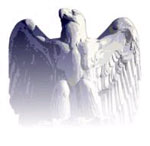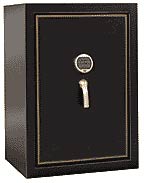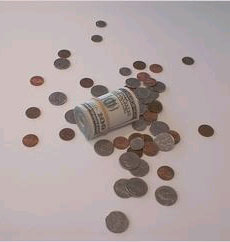| (insert your NIE or newspaper logo here) |
Weekly Online LessonOnline Lesson ArchiveGrade Level: 8-12
|
Banking On The Economy
 On
Thursday, October 30, 2003, the Bureau of Economic Analysis, a division
of the U.S. Department of Commerce, released its report on the nation's
economy, revealing that the real gross domestic product (GDP) grew at
an estimated 7.2 percent annual rate in the third quarter of 2003, the
largest increase within the last 20 years.
On
Thursday, October 30, 2003, the Bureau of Economic Analysis, a division
of the U.S. Department of Commerce, released its report on the nation's
economy, revealing that the real gross domestic product (GDP) grew at
an estimated 7.2 percent annual rate in the third quarter of 2003, the
largest increase within the last 20 years.
The GDP is the most common measurement of overall activity in the U.S. economy. It combines dozens of measurements covering consumption spending, investment spending, government spending, and net exports. Real GDP growth is the increase in GDP when adjusted for inflation.
This surprise rise in our economy, the report says, can be primarily attributed to consumer spending, which increased at a 6.6 percent annual rate, the fastest since 1997. Recent tax relief, including across-the-board reductions in personal income taxes and recent child tax credit refunds — helped increase what's referred to as "disposable" income. This, in turn, boosted consumer spending, which accounted for nearly two-thirds of the GDP growth.
Business investment and net exports, which increased at a 9.3 percent annual rate, were also large contributors to GDP growth.
While the news clearly influences political campaigns and corporate business decisions, what does the BEA's quarterly economic report mean to YOU, now and in the future?
To find out, this week you're going to discover how the economy works to get a general understanding of how it affects your life and the financial well-being of the nation. You'll also get a handle on your own personal finances, including how banks work, how to plan and stick to a budget, and learn some other helpful tips on managing your money so you can be well-prepared no matter what turn the economy takes.
How the Economy Works
 First
you'll need to understand what exactly drives our economy. So to start,
you'll need to learn about the How
the Federal Reserve Works, and why the Fed is considered
the "gatekeeper of the economy."
First
you'll need to understand what exactly drives our economy. So to start,
you'll need to learn about the How
the Federal Reserve Works, and why the Fed is considered
the "gatekeeper of the economy."
After the Introduction, read about Why do we need the Fed? and What does the Fed do?
What's was the original purpose of the Fed? How does it adjust for inflation, and what does that mean for consumers and businesses? What exactly are the responsibilities of the Fed's two divisions?
Next, read about the The Fed Tool Box and How is the Fed set up? How does the structure of the Fed, including the ways they can influence certain variables, help maintain a relatively stable economy?
What are some of the Economic Indicators used in measuring the strength and trends of the economy? How do the Checks and Balances help ensure that the Fed doesn't abuse its authority?
To understand more about how the economy works, also browse through How Recessions Work. How does a recession happen? How does it get "fixed"?
Banking For Your Future
 No
matter what the state of the economy, you are — or soon will be
— responsible for paying your own bills, from rent to food to
transportation and entertainment. In the meantime, you may want to be
saving for college, a car, or other large investment.
No
matter what the state of the economy, you are — or soon will be
— responsible for paying your own bills, from rent to food to
transportation and entertainment. In the meantime, you may want to be
saving for college, a car, or other large investment.
So where should you start learning about these things?
A great resource to plug into is Banking On Our Future, an interactive Flash-driven website hosted by Wells Fargo Banks. (If you have problems viewing this site, or would prefer a lower-tech version, visit The U.S. Mint's site, It Makes Cents, which contains similar information and is easy to navigate.)
When you click on Enter at the Banking On Our Future site, a pop-up window will open with navigation choices. If you aren't able to listen to the audio that accompanies these pages, turn on the Closed Captioning for text versions. Also, as you move through the different sections, the site offers a pop-up Calculator to help you with the activities.
 Start
with the Basics of Banking, which provides a great
introduction to this topic. Then move onto the Budgeting
section.
Start
with the Basics of Banking, which provides a great
introduction to this topic. Then move onto the Budgeting
section.
Do you have any fixed, flexible or discretionary expenses? What kinds of spending do you do the most? How might your current economic situation change in the next year or two? How about in the next five years? What factors, such as your earning power or fixed living expenses, will likely influence these changes?
The rest of this site offers hands-on help to understand how you can manage your money through Savings and Checking accounts, the Power of Credit, and Investment. Also take the Assessment quiz, if you have time.
In what ways can a checking or savings account help you manage your money? How exactly does credit work? How do you think consumers with credit cards get into debt? What kinds of investments do you make now? What kinds of investments might you make in the future and why?
How might fluctuations in the national economy influence your money management decisions? How might changes affect your employment? What other factors may also inflence your financial stability? What kinds of action can you take now and in the future to help ensure that you will consistently have enough money to live on?
Newspaper Activities
Browse current issues of Targetnewspaper to find stories related to the economy, whether it's about corporate business moves, job creation, unemployment, consumer trends, bank issues, or investment news. Is the news related to local, regional, national, or international economics? Is it an indicator of the nation's overall economy or more of an isolated event? How does the news directly or indirectly affect you, your household, or others you know? Does the news affect people differently or unequally? If so, then why? If it doesn't seem to affect you or others you know at all, why doesn't it?
© Copyright 2003
Learners Online, Inc.
